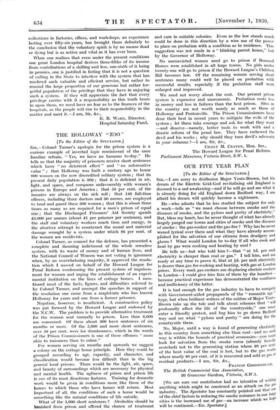THE HOLLOWAY " ZOO "
[To the Editor of the SPECTATOR.]
Sin,—Colonel Turner's apologia for the prison system is a curious example of inverted logic reminiscent of the once familiar refrain, " Yes, we have no bananas to-day." He tells us that the majority of prisoners receive short sentences which have no deterrent effect " and " no reformative value " ; that Holloway was built a century ago to house 000 women on the now discredited solitary system ; that its present daily population is 300 ; that it is deficient in air, light, and space, and compares unfavourably with women's prisons in Europe and America ; that 50 per cent. of the inmates are always on the sick roll ; that 140 full-time officers, including three doctors and 30 nurses, are employed to tend and guard these 300 women ; that this is about three times as many as are required for a men's prison of equal size ; that the Discharged Prisoners' Aid Society spends £3,000 per annum (about £1 per prisoner per sentence), and the staff and voluntary workers much time and energy, in the abortive attempt to counteract the moral and material damage wrought by a system under which 86 per cent. of the women are recidivists.
Colonel Turner, as counsel for the defence, has presented a complete and damning indictment of the whole senseless system, with its waste of money and of human lives, and the National Council of Women was not voting in ignorance when, by an overwhelming majority, it approved the resolu- tion which I moved on behalf of the Howard League for Penal Reform condemning the present system of imprison- ment for women and urging the establishment of an experi- mental institution on the lines of cottage homes. I men- tioned most of the facts, figures, and difficulties referred to by Colonel Turner, and amongst the speeches in support of the resolution one came from a magistrate who has known Holloway for years and one from a former prisoner.
Negation, however, is insufficient. A constructive policy was put forward by the Howard League and endorsed by the N.C.W. The problem is to provide alternative treatment for the women sent annually to prison. Less than 6,000 are concerned. Of these about 300 have sentences of six months or more. Of the 5,000 and more short sentences, over 50 per cent. were for drunkenness, which in the words of the Prison Commissioners is one of those offences " more akin to nuisances than to crime."
For women serving six months and upwards we suggest a colony on the cottage home principle. Here they could be grouped according to age, capacity, and character, and classification would become less difficult than in the big general local prisons. There would be the light, air, space, and beauty of surroundings which are necessary for physical and mental health. The ugliness of prison and prison life is one of its most disastrous features. Training for domestic work would be given in conditions more like those of the homes to which those who have homes will return. Most important of all, the conditions of such a home would be something like the natural conditions of life outside.
What of the 5,000 short sentences ? Alcoholics should be banished from prison and offered the chance of treatment and cure in suitable colonies. Even as the law stands much could be done in this direction by a wise use of the power to place on probation with a condition as to residence. This suggestion was not made in a " blinking parrot house," but by the Governor of Holloway.
No unconvicted women need go to prison if Remand Homes were established in all large towns. No girls under twenty-one will go to prison if the Howard League's Children Bill becomes law. Of the remaining women serving short sentences many could well be placed on probation with successful results, especially if the probation staff were enlarged and improved.
We need not worry about the cost. Our present prison system is expensive and uneconomic. Probation costs less in money and less in failures than the best prison. Sites in the country arc not worth nearly as much as those of Holloway and Pentonville. The Prison Commissioners have done their best in recent years to mitigate the evils of the system ; let them take courage and ask for what they want —and deserve—namely, better tools to work with and a drastic reform of the penal law. They have eschewed the devil and his works ; why should they turn devil's advocate in your columns ?—I am, Sir, &c.,
CICELY M. CRAVEN, Hon. Sec., The Howard League for Penal Reform. Parliament Mansions, Victoria Street, S.W. 1.










































 Previous page
Previous page